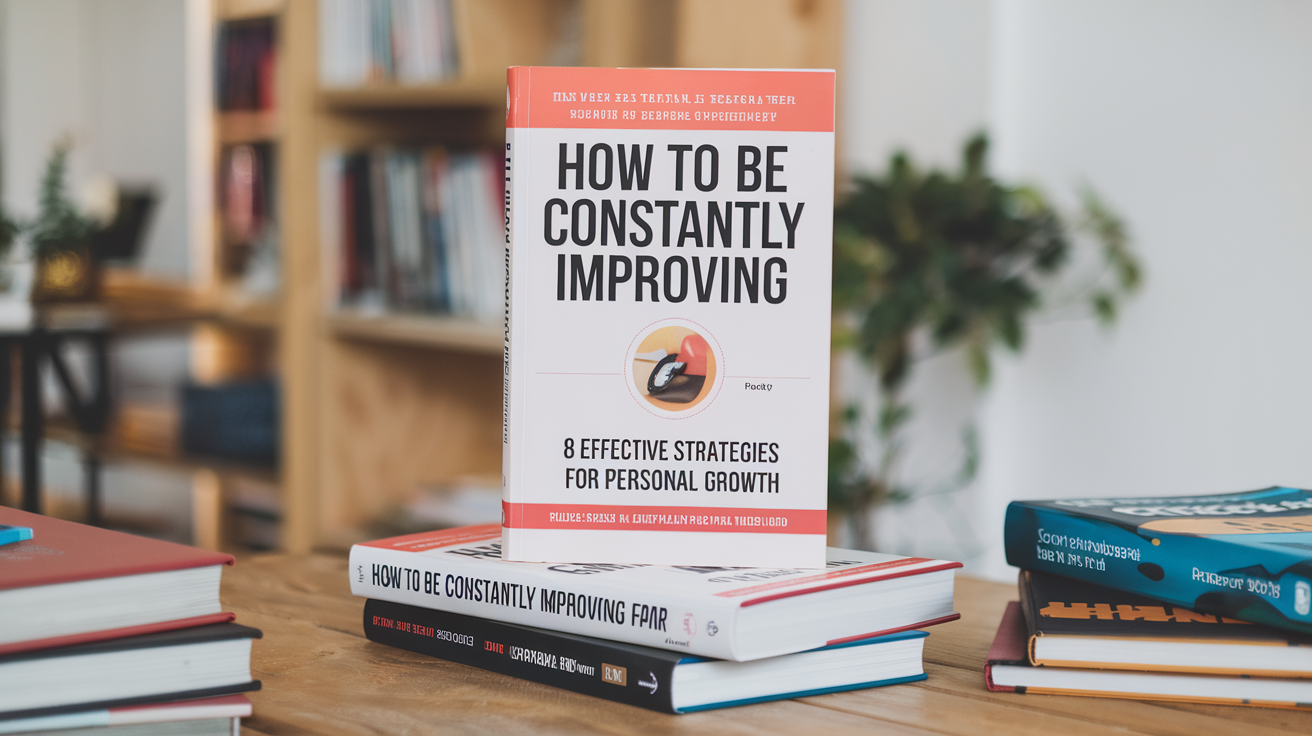In today’s fast-paced world, the ability to adapt and grow is more important than ever. But how can you ensure you’re always moving forward and becoming the best version of yourself? By focusing on how to be constantly improving, you can develop habits and strategies that lead to continual personal and professional growth. In this guide, we’ll explore 8 powerful ways to keep improving every day.
1. Read Books 📚
Reading books is one of the most effective ways to learn from the best minds throughout history. Whether you’re diving into a classic novel, exploring new ideas in non-fiction, or consuming the latest in self-help, books provide endless opportunities for growth.
How to Make the Most of Reading:
Set a Reading Goal: Aim to read a certain number of books per month or year. Even 20 minutes of reading each day can have a significant impact over time.
Diversify Your Reading List: Don’t stick to just one genre. Explore fiction, non-fiction, biographies, and different subjects to broaden your perspective.
Take Notes: As you read, jot down key takeaways, quotes, or ideas. This not only helps with retention but also makes it easier to review and apply what you’ve learned.
Why Reading is Crucial:
Reading helps you gain new knowledge, improve focus and concentration, and enhance your critical thinking skills. It’s like having a personal mentor at your fingertips, ready to offer advice and insights whenever you need them.
2. Listen to Podcasts 🎧
Podcasts are an excellent way to fill the gaps in your day with educational content. Whether you’re commuting, exercising, or even doing household chores, you can learn something new just by listening.
How to Integrate Podcasts into Your Routine:
- Subscribe to Diverse Shows: Choose podcasts that cover a wide range of topics, from self-improvement and business to history and science. This ensures you’re always learning something new.
- Listen During Downtime: Use moments like your morning routine, workout, or commute to tune into a podcast. It’s a productive way to make the most of your time.
- Take Actionable Notes: Just like with books, jot down interesting ideas or strategies you hear in podcasts. Implement these ideas in your life to see real change.
Why Podcasts Matter:
Podcasts allow you to learn from experts, stay updated with trends, and explore new ideas—all without needing to set aside dedicated time for learning.
3. Take a Course 🎓
Continuous learning is key to staying competitive and adaptable in today’s world. With the wealth of free and paid courses available online, there’s no excuse not to keep learning.
How to Choose the Right Course:
Identify Your Goals: Determine what you want to learn and why. Whether it’s a new language, coding skills, or personal development, knowing your end goal will help you choose the right course.
Opt for Quality: While there are plenty of free resources, sometimes a well-structured paid course can save you time and provide deeper insights.
Apply What You Learn: Immediately use your new knowledge or skills in real-world situations. This could mean working on a personal project, applying skills at work, or even teaching others.
The Value of Lifelong Learning:
Taking courses allows you to stay ahead in your career, learn new hobbies, and continuously improve your knowledge base. It’s an investment in yourself that always pays off.
4. Practice Old Passions 🎨
Reconnecting with old passions is a great way to rejuvenate your spirit and fuel creativity. Whether it’s painting, playing an instrument, or gardening, revisiting activities you once loved can bring joy and inspiration.
How to Reignite Your Passions:
- Set Aside Time: Dedicate a specific time each week to engage in your old passions. Treat it as a non-negotiable part of your schedule.
- Join a Community: Find a group or community that shares your passion. Whether it’s an online forum or a local club, being around like-minded individuals can reignite your enthusiasm.
- Combine Passions with New Interests: Integrate your old passions with new skills or hobbies. For example, if you loved photography and are now learning coding, try building a photography portfolio website.
Why This Matters:
-
Reconnecting with your passions helps reduce stress, increases happiness, and can even lead to new career opportunities. It keeps you connected to what you love, fueling your overall sense of well-being.
5. Get Feedback & Critique 🗣️
Seeking feedback is crucial for growth. It’s not always easy to hear, but constructive criticism from trusted individuals can help you identify areas for improvement and refine your skills.
How to Effectively Seek Feedback:
Ask the Right People: Choose mentors, colleagues, or friends who will give you honest and constructive feedback, not just compliments.
Be Open-Minded: Approach feedback with an open mind. Remember, it’s an opportunity to grow, not a personal attack.
Act on Feedback: Implement the feedback you receive. Make adjustments, try new approaches, and continuously seek ways to improve based on the insights given.
The Power of Feedback:
Constructive feedback helps you see blind spots, improve your performance, and advance faster in your personal and professional life. It’s a key element in the process of continuous improvement.
6. Work Towards a Goal 🎯
Setting and working towards goals gives your efforts direction and purpose. Whether it’s a short-term objective or a long-term aspiration, having a clear goal keeps you focused and motivated.
How to Set Effective Goals:
- Use SMART Criteria: Ensure your goals are Specific, Measurable, Achievable, Relevant, and Time-bound. This framework helps you create actionable and realistic goals.
- Break Down Goals: Divide your main goal into smaller, manageable tasks. Celebrate small victories along the way to stay motivated.
- Review and Adjust: Regularly review your progress and be open to adjusting your approach if needed. Flexibility can be key to achieving long-term success.
The Importance of Goal-Setting:
Working towards a goal provides structure, keeps you motivated, and ensures you’re always moving forward. It transforms your ambitions into achievable milestones.
7. Be Open to Change 🌱
Embracing change is essential for personal growth. Without the willingness to change, it’s difficult to improve or adapt to new circumstances. Being open to change means you’re ready to learn, unlearn, and relearn.
How to Cultivate Openness to Change:
Adopt a Growth Mindset: Believe in your ability to grow and adapt. View challenges as opportunities to learn rather than threats.
Seek New Experiences: Try new activities, travel, or meet new people. Exposure to different environments can broaden your perspective and increase your adaptability.
Reflect Regularly: Periodically assess your life and ask yourself what areas might benefit from change. This practice keeps you proactive rather than reactive.
Why Embracing Change is Crucial:
Openness to change keeps you flexible, adaptable, and ready to seize new opportunities. It’s a mindset that drives innovation and personal evolution.
8. Get Around Community 👥
Surrounding yourself with the right people is vital for growth. The people you spend the most time with can influence your habits, mindset, and overall progress. Choose a community that supports and challenges you.
How to Build a Supportive Community:
Join Groups Aligned with Your Interests: Whether it’s a professional network, hobby club, or online forum, find communities that resonate with your goals and values.
Be an Active Participant: Don’t just be a passive member—engage, contribute, and build relationships within the community.
Seek Mentorship: Find mentors within your community who can provide guidance and support as you work towards your goals.
The Impact of Community:
Being part of a supportive community can provide motivation, accountability, and inspiration. It’s a powerful factor in maintaining momentum on your journey of constant improvement.
Conclusion: How to Be Constantly Improving: 8 Effective Strategies for Personal Growth
The journey of how to be constantly improving is ongoing and requires dedication. By integrating these 8 strategies—reading, listening to podcasts, taking courses, practicing passions, seeking feedback, setting goals, embracing change, and building community—you can ensure that you’re always moving forward. Remember, continuous improvement is not about perfection, but about progress. Start with one strategy today, and watch how it transforms your life over time.


















